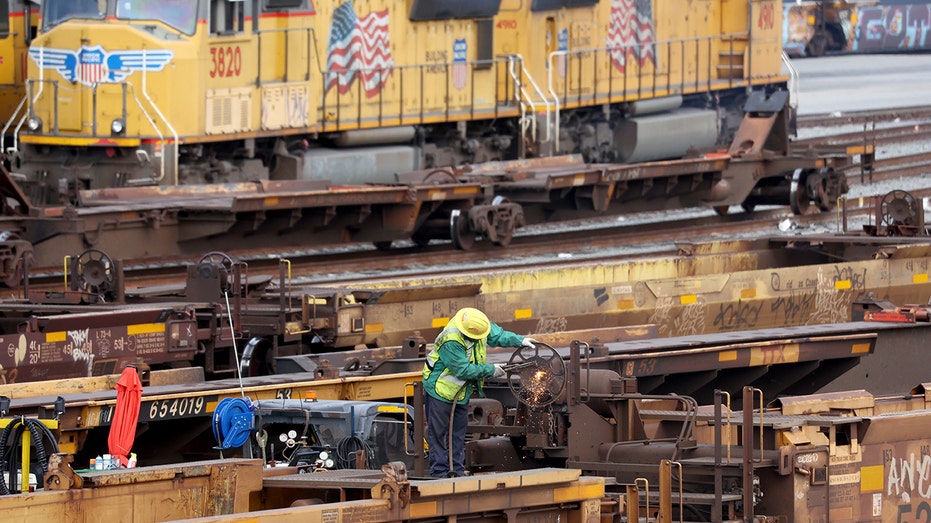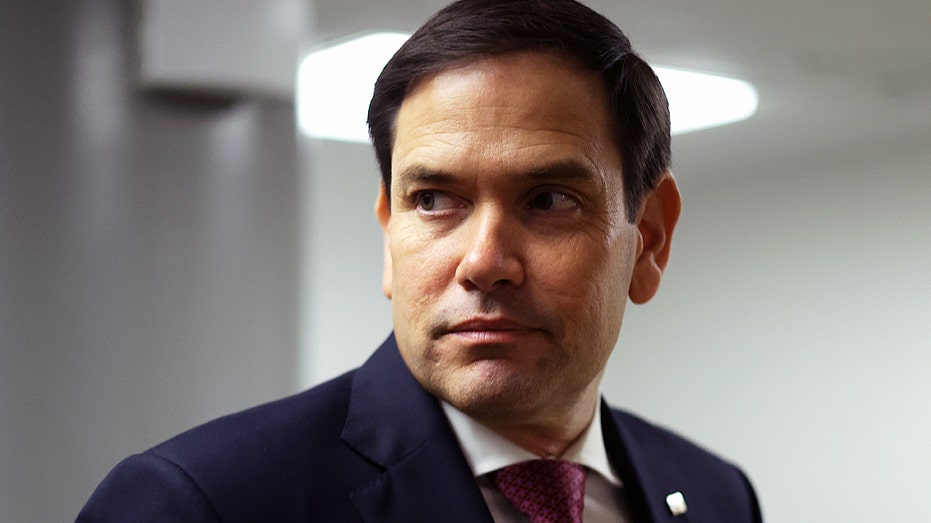Rubio slams Senate failure to secure paid sick leave for rail workers: Not 'line items on a spreadsheet'
Senate aligns with House and passes rail legislation
IWF Center for Economic Opportunity director Patrice Onwuka discusses the rail legislation passage and ongoing high prices despite cooling inflation on ‘Fox Business Tonight.’
Sen. Marco Rubio slammed the Senate’s failure to secure additional days of paid sick leave for rail workers and argued conservative lawmakers focus too much on productivity.
"As conservatives, we should believe in the dignity of work – that work isn’t just a way to make money," Rubio said in a statement. Adding that it "is also a means to provide for our families, participate in our communities, and build a better nation."
"When workers are treated as little more than line items on a spreadsheet, they become indistinguishable from the freight cars they service," Rubio argued.
A rail employee works a Union Pacific Intermodal Terminal rail yard on Nov. 21, 2022, in Los Angeles. (Mario Tama/Getty Images / Getty Images) AOC, RUBIO FIND COMMON GROUND ON RAIL UNION STRIKE: 'A RARITY' The senator’s comments followed a vote on three measures relating to rail workers demands, including one which the Senate passed in an 80-15 vote codifying an agreement negotiated by the White House and 12 of the nation’s Rail Unions. The bill will raise workers pay by 24% over a five-year period from 2020 through 2024, including an immediate payout on average of $11,000 upon ratification. It will also allow rail workers to take time off for medical appointments without penalization – though as Rubio noted the workers have to give 30 days’ notice and can only book appointments Tuesday – Thursday. Though the major sticking point is that the measure only granted rail workers one day of paid sick leave all year – a stipulation that Rubio said "underwhelmed and alienated the men and women doing the hard work." Some Democrats and Republicans voted against the bill, including Rubio, and argued it did not do enough to address rail workers demands after they called for 15 days of paid sick leave. The House attempted to address these calls by pushing through a separate resolution that would grant workers seven days of paid sick leave. A worker rides a rail car at a BNSF rail crossing in Saginaw, Texas, Wednesday, Sept. 14, 2022. (AP Photo/LM Otero / AP Newsroom) SENATE PASSES BILL TO PREVENT RAIL STRIKE, WHICH COULD HAVE WREAKED HAVOC ON ECONOMY BEFORE HOLIDAYS The resolution fell short of worker demands but also ran counter to rail corporations that opposed the paid sick leave – a move House leaders hoped would help prevent a nationwide rail strike. However, the Senate did not meet the 60 vote threshold and the resolution failed a 52-43 vote. West Virginia Sen. Joe Manchin was the only Democrat in either chamber to vote against the measure, while some hardline Republicans like Texas Sen. Ted Cruz, South Carolina Sen. Lindsey Graham and Rubio crossed party lines and supported the resolution. "Congress should have sent everyone back to the negotiating table, but instead it told rail workers to suck it up and be grateful," Rubio said. "We should have worked to meet the demands of the workers instead of appeasing labor leaders and companies." Rubio argued that it was the rail companies not the workers that risked a nationwide shutdown "because they wouldn’t give their workers any paid sick days." It is unclear if the agreement reached by the White House and solidified by Congress will be enough to fully stop a strike that could happen as early as Dec. 9 and has the potential to wreak havoc on the U.S. economy. However, Rubio argued that the more than 170,000 people who work in the rail industry will remember the government’s failure to secure them paid sick leave. Sen. Marco Rubi, R-Fla., arrives at the U.S. Capitol, Oct. 6, 2021, in Washington, D.C. (Alex Wong/Getty Images / Getty Images) CLICK HERE TO GET THE FOX BUSINESS APP "Our nation’s economic priorities have swung too far toward efficiency," he said. "The president, labor leaders, and rail companies should have done better by the men and women who keep our nation running every day. "It won’t go unnoticed by those who wake up tomorrow and go to work," he added. Source: Read Full Article



